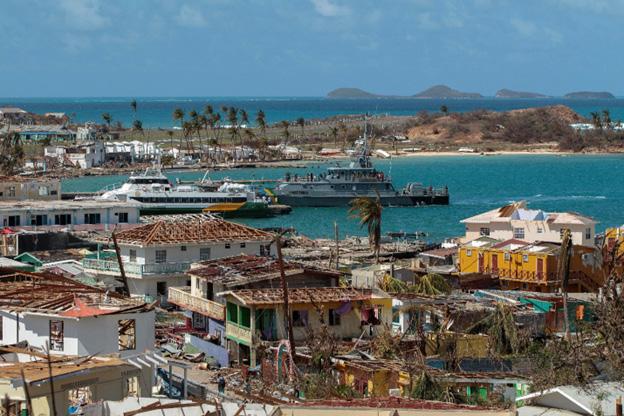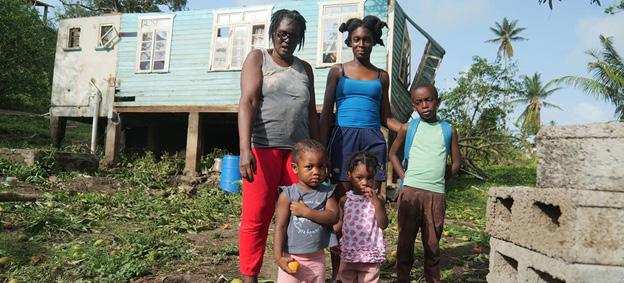
3 minute read
OVERVIEW OF THE SITUATION IN THE CARICOM ISLANDS
In what has been predicted to be an active hurricane season, Hurricane Beryl made an unprecedented early impact on the Caricom islands of Grenada, Jamaica, and St. Vincent and the Grenadines. The storm, which rapidly intensified from a tropical depression into a Category 4 hurricane and briefly reached Category 5 status, has left a trail of devastation across these islands. This document outlines the specific needs and challenges faced by each of these islands in the aftermath of Hurricane Beryl, highlighting the extensive damage and the international response efforts to aid recovery.
Impact on Grenada
Advertisement
Hurricane Beryl made its first landfall on the island of Carriacou, part of Grenada, on July 1. The storm brought unprecedented destruction, affecting the entire population of Carriacou. Roads became impassable, and communication networks were down for several days. The severity of the crisis has created severe logistical challenges in delivering aid and restoring basic services. Despite the rough seas and damaged infrastructure, international aid, including assistance from nearby nations and a French ship, has begun to arrive to support the recovery efforts.
Simon Springett, UN Resident Coordinator in Barbados and the Eastern Caribbean, reported via video link from Grenada, describing the scene as one of total devastation. “The entire island is completely affected … that is literally 100 percent of the population,” he stressed. The immediate needs include clearing roads, restoring communication lines, and providing essential supplies such as food, water, and medical aid.
Impact on St. Vincent and the Grenadines
Union Island, part of St. Vincent and the Grenadines, also felt the full force of Hurricane Beryl on July 1. The island experienced catastrophic damage, with virtually every building either destroyed or severely damaged. The majority of the population is now homeless, facing immediate needs for shelter, food, and clean water. Communication and power remain largely disrupted, complicating the relief efforts. The local government, along with international partners, is working to address these urgent needs, but the scale of the destruction requires substantial international assistance.
Residents have shared harrowing accounts of the destruction, with Coy stating that “literally, almost the whole island is homeless.” Sebastien Sailly described the storm’s impact as “like a tornado has passed through here. Ninety percent of the island – easily 90 percent – has been erased.” The community’s immediate priorities are shelter, food, and water, with additional needs for generators, sanitary products, and medical supplies.

Impact on Jamaica
Hurricane Beryl impacted Jamaica on July 3, bringing significant destruction, particularly to the agricultural sector. The storm caused widespread damage to crops, livestock, and fishing infrastructure, leading to immediate concerns about food shortages. The southern coast of Jamaica, including the parishes of Clarendon, Manchester, and St. Elizabeth, experienced severe flooding and power outages. The Jamaican government, supported by the UN and other international organizations, is conducting detailed damage assessments and coordinating relief efforts to restore essential services and support the recovery of the agricultural sector.
Agriculture Minister Floyd Green reported that over $6.4 million in crops and supporting infrastructure were destroyed. He highlighted the significant damage to vegetables, yams, cassava, breadfruit, ackee, mangoes, and bananas. Livestock and poultry farmers also suffered substantial losses. The government is working on a response plan to assist affected farmers and ensure the restoration of the food supply chain. The total assessment of damage is still ongoing with and a final cost to be determined.
The unprecedented early arrival and intensity of Hurricane Beryl have highlighted the vulnerability of the Caricom islands to such extreme weather events, which are becoming more frequent and severe due to climate change. The extensive damage and humanitarian needs across Grenada, St. Vincent and the Grenadines, and Jamaica underscore the necessity for robust international cooperation and support.
We call upon the global community, international aid organizations, and governments to mobilize resources and provide immediate assistance to the affected islands. This includes financial aid, technical support, and the provision of essential supplies such as food, water, medical aid, and construction materials. Additionally, efforts should focus on rebuilding infrastructure to be more resilient to future storms, investing in disaster preparedness, and addressing the root causes of climate change to mitigate the impact of such devastating events. Together, we can help these islands recover and build a more sustainable and secure future for their inhabitants.



